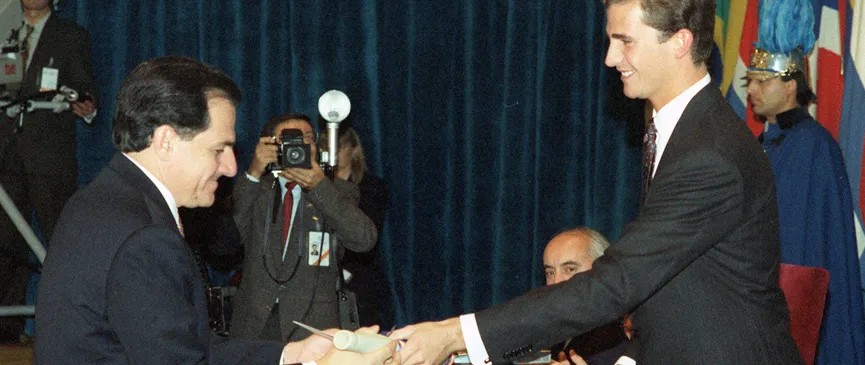Main content
Puerto Rico's People Prince of Asturias Award for Literature 1991

On April 1991, the people of Puerto Rico reaffirmed their Hispanic cultural roots with the declaration of Spanish as the island´s only official language. During the course of a solemn official ceremony, the governor of the Commonwealth, Rafael Hernández Colón, overturned an Act of 1902 which established English and the Spanish tongue as co- official Puerto-Rican languages.
The leader of the country thus signed a bill before the House of Representatives which recognises Spanish to be the only official language. The governor, Rafael Hernández, stated at the moment of signing, "With this, we reaffirm the country´s will to exist. We declare our mother tongue to be our most precious sign of identity. We project our potential, discovering ourselves inside ourselves, wanting to be ourselves, fighting against being someone else. With the strength which comes down to us from the most intimate part of our ego, we are preparing to act in history. Through this great exercise of our will, we are protecting the rich heritage of the generations which preceded us, the generations which blended Indian, African and Spanish in that special way which makes a Puerto-Rican."
Manuel Alvar, Director of the Royal Academy of the Spanish Language, and a guest at the official ceremony held in Puerto Rico, made a fine speech in which he made clear, among other points, the following, "...What you have done is an act of faith; beyond the contingencies and realities there lies a transcendent act, the spirit which speaks through a language. And that spirit unites us, brings us closer and makes us brethren ... And after you, twenty free peoples will say you were right, that we share our faith and we greet your loyalty with open hands and with joy like the flutter of birds held in our fingers ... And Puerto Rico gives us a beautiful, thought-provoking lesson, because what it defends its not its faith in the nation, but the faith of all those who one day might have lost it, yet have found it here for ever.
The decision of Puerto Rico caused numerous reactions among the most outstanding representatives of modern-day Latin-American literature, who have greeted this decisive step with joy. "A well-deserved triumph for the people of Puerto Rico," said the Uruguayan writer Mario Bendetti. The Nobel Prize-Winner for Letters, Camilo José Cela, admitted, "The Puerto-Ricans are showing the way to we Spaniards, who are stumbling ever closer to the Philippines and the wrong road they went down." "Puerto Rico rediscovers in its laws a linguistic destiny which its people never abandoned," declared Juan Carlos Onetti. To the support of well- known literati such as Carlos Bousoño, Antonio Buero Vallejo or Miguel Delibes, among many others, may be added that of Jose Agustín Goytisolo, "This initiative, which means the reparation of a historical wrong, has moved me. Language is what distinguishes a community."
Article 1 of the Act recognising Spanish as the sole official language of Puerto Rico, literally says the following: "It is declared and laid down that Spanish shall be the official language of Puerto Rico, to be used in all departments, political subdivisions, agencies, offices and governmental authorities of the executive, legislative and judicial powers of the Commonwealth of Puerto Rico."
End of main content
